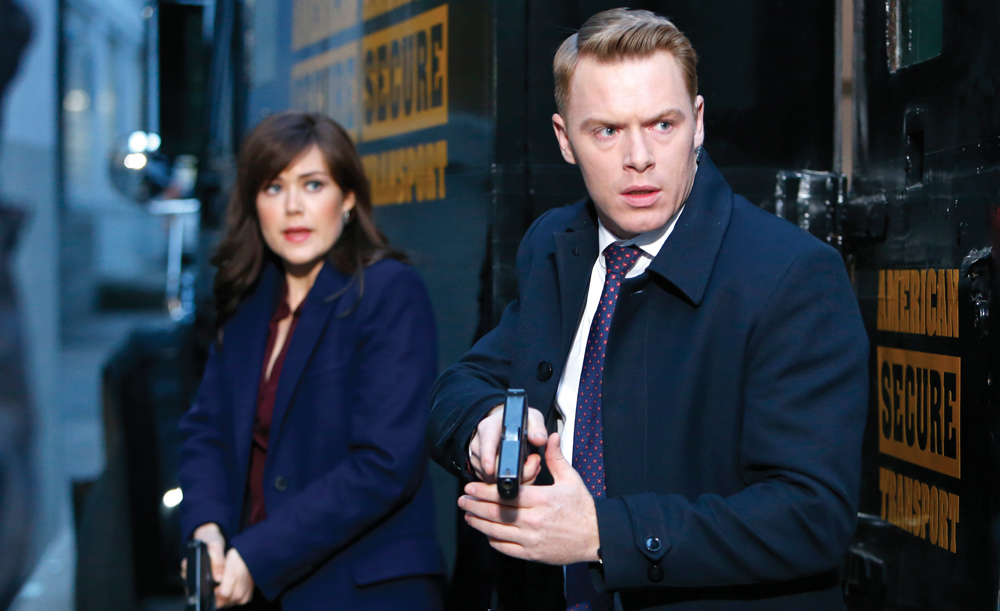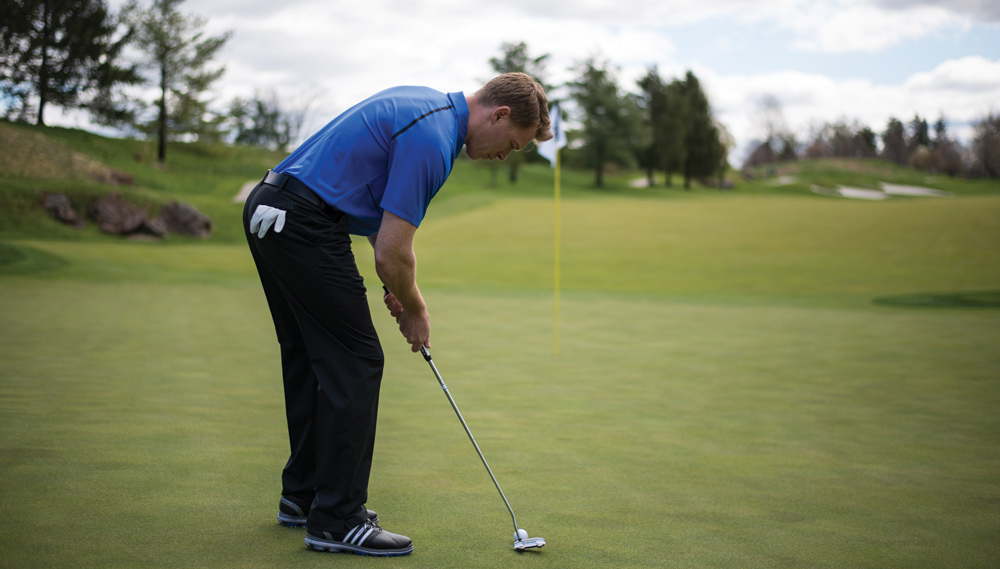
A bigger fan of action than he is of conversation, Diego Klattenhoff reminds the editor that golf balls are born to be punished
Hay rash is a pain in the ass. The burning welts and redness that appear after a long day of slinging bales of hay around are more painful than one might think, and it only gets worse that night. The way to prevent it is to cover your arms with something like a flannel shirt, and in summer that’s just plain miserable.
“Oh man, in summer, up in the hay loft, flannel shirt on, sweat streaming down your face… Yeah, it’s boiling.”
Diego Klattenhoff says this matter-of-factly, not as a complaint. The actor, best known for his roles on the shows Homeland and, more recently, The Blacklist, grew up on his family’s farm in a part of Nova Scotia where much of life is matter-of-fact. It’s a sharp contrast to Hollywood, where he’s found success and where he lives sometimes, when he’s not in New York City filming or traveling overseas on promotional duties. Farms are full of unassailable truths like hay rash—and hard work, which Klattenhoff never minded either.
There’s some Steve McQueen in this guy, I decide, happy that he ordered a beer and not a smoothie while we’re playing the course at TPC Jasna Polana in New Jersey. He’s certainly had to network in Hollywood—everyone does—but after a short time it’s obvious that his success is more likely due to his strong work ethic than to any love of indulging in BS. Testament to his determination: Homeland, The Blacklist, a role in the film Mean Girls, an appearance in the Guillermo del Toro film Pacific Rim, and on and on… Already established as a solid actor, his star’s going in the right direction. Beyond that, he keeps his personal life personal, shows up to work on time and occasionally likes to let off some steam on a golf course. Because the same farm that shaped his work ethic also shaped his formidable shoulders and arms, that’s bad news for the golf ball.

“I almost never use my driver,” Klattenhoff tells me, pulling out a new Callaway 3-wood on yet another tee. “Usually I just don’t need it.”
It’s not a boast; the guy crushes the ball. In one instance on a par-3, I hit a soft 8-iron and landed six feet left of the green. Diego hit a wedge and landed four feet past it. “Sand wedge next time?” I offered. “You’ve got nothing left in the bag.”
“I was golfing at this charity event in Glendale,” he recounts. “They loaned me these whippy clubs with crazy shafts; they just kind of bent all around when I swung. So we were coming back toward the clubhouse and the entire front of the thing is glass, all windows, and it’s full of people and everybody’s looking out. I decide to go for it in two, so I just went for it with the swing—and it took the clubhead a minute to catch up, I mean I’m at the bottom of the swing and the clubhead’s just passing my head, and then it whipped around and this ball just ballooned and it was heading for those 10-foot windows and I was thinking, ‘Oh, man, it’s gonna go right through the glass!’ But it just kept going and finally it rattled off the clubhouse roof.”
Baseball, hockey and scrapping were the sports of choice in French River, the town in Pictou County, Nova Scotia, where Diego’s father decided to settle down.
A well-educated man and a potter, he’d come from Bremen, Germany, set up the farm and started a family.
“I grew up playing baseball,” Klattenhoff says. “In our county there was no money, it was rural, so lots of neighbors’ kids would come for miles. You’d ride your bike in to play baseball or road hockey, beat the f*** out of each other and then you’d go home. We were 6-, 7-, 8-year-olds. Golf was never a thing.”
Diego and his two brothers spent their young lives in a world of paper mills, steel mills, shipbuilding and coal mining, working fields and moving hay like the other kids in the area. The idea of being a famous actor was a million miles away. Golf, as it turned out, was a little closer.
“There was a 9-hole golf club in Pictou, and dad had a membership,” Klattenhoff says. “It stunk like hell because it was near a mill. I’d hang out, eat peanuts, listen to dad shoot the breeze with his friends. I had a great time. It was totally different, it was foreign; you played hockey or baseball.”
Diego’s father taught him to swing a club, and he liked it enough that he’d practice hitting a ball from his family’s field to a neighbor’s field across the road—“something to do,” he says, for a kid in what felt like the middle of nowhere. As foreign as playing golf in Pictou County, perhaps, Diego discovered an interest in acting, and a trip to the movies eventually decided it.
“I saw an article on the movie Boogie Nights, and decided I wanted to see it. I’d only been to the theater a few times, and I went with my brother. I was blown away.
I thought, ‘I want to be in that movie.’”
At the age of 19 Klattenhoff decided that he’d had enough of small-town life and moved to the big city of Toronto to take acting classes. He found a job as a bartender and began working on the rest of his life.
“I knew one person there in theater, and he was in this method [acting] class. I had nothing else, so I thought why not. It turned out to be crazy abusive: you go in the room and there’s some woman weeping in the corner, over here some guy’s ready to punch someone out… It was interesting, but it was like you’re joining the French Foreign Legion or something.”
More classes followed, with Diego eventually studying under the highly regarded acting coaches David Rotenberg, Bruce Clayton and Rae Ellen Bodie, among others. The rest, as they so often say, is history. His role as Mike Faber on Homeland earned him worldwide acclaim (and a friendship with fellow Homeland actor Damian Lewis, with whom he occasionally golfs) and The Blacklist, on which he plays FBI agent Donald Ressler, is only growing in popularity, with millions of viewers worldwide.

He brings as much athleticism to his roles as he does acting talent, evidenced in the constant stream of action scenes in Blacklist, and anyone could argue that he’s done a good job in choosing his roles.
“Who knows how you find a role, exactly,” he says. “When you read it, it sparks something in you. Like Homeland: I thought, “It doesn’t matter what, I just want to be part of this tale.”
For Blacklist, a car picks him up from his NY apartment sometime after 5a.m. He runs lines in the back seat on the way to work, which can start near 6. As the week goes on the shooting days get longer and longer, so Diego often gets home in the early hours. That’s most of the year, with a few months “off” to do obligatory promotional travel for the show and to audition for other projects. For all of the obvious rewards, it’s a tough career and one that you have to earn. That’s not to say that French River rolls out the red carpet when he goes home: “People kind of don’t notice,” he says. “There are three guys in the NHL where I’m from; they’re heroes.”
It doesn’t seem to matter to him, and after most of a day together I’m not surprised. Straightforward and down-to-earth, the guy doesn’t appear to be chasing success so much as he is a challenge—no matter what he’s doing.

“Acting has the discipline of sports, it’s an art form for a reason,” he says. “Trying, failing; trying, failing. If you’re gonna do it, you do it. That’s your singular focus: figure out your riddle. It seems so simple when someone who knows how to do it is doing it—and it’s not, it’s so complex. Right when you think you’ve figured it out it kicks you in the ass.”
No wonder the guy likes golf.
Follow Us On


| Cookie | Duration | Description |
|---|---|---|
| cookielawinfo-checkbox-analytics | 11 months | This cookie is set by GDPR Cookie Consent plugin. The cookie is used to store the user consent for the cookies in the category "Analytics". |
| cookielawinfo-checkbox-functional | 11 months | The cookie is set by GDPR cookie consent to record the user consent for the cookies in the category "Functional". |
| cookielawinfo-checkbox-necessary | 11 months | This cookie is set by GDPR Cookie Consent plugin. The cookies is used to store the user consent for the cookies in the category "Necessary". |
| cookielawinfo-checkbox-others | 11 months | This cookie is set by GDPR Cookie Consent plugin. The cookie is used to store the user consent for the cookies in the category "Other. |
| cookielawinfo-checkbox-performance | 11 months | This cookie is set by GDPR Cookie Consent plugin. The cookie is used to store the user consent for the cookies in the category "Performance". |
| viewed_cookie_policy | 11 months | The cookie is set by the GDPR Cookie Consent plugin and is used to store whether or not user has consented to the use of cookies. It does not store any personal data. |